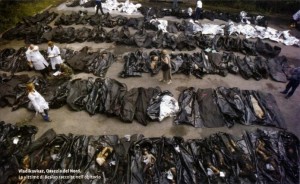As usual, Richard Fernandez gets to the heart of the matter with the least number of detours.
The important thing to remember about rebellions, even small ones, is that everyone who thinks they can control the forces unleashed — can’t. That goes for Obama and that goes for Trump. A friend who was a veteran of the Anbar Surge wrote that democracy was scary and to calm himself down he repeated to himself Winston Churchill’s soothing words: “Democracy is the worst form of government, except for all the others.”
Yes, I think we are on the threshold of a revolution. Whether it is a Revolution, with a capital R, is yet to be seen.
Fernandez begins with the incident of Gessler’s Hat.
in 1307 Gessler raised a pole in the market square of Altdorf, placed his hat atop it, and ordered all the townsfolk to bow before it. Tell, whose marksmanship and pride were legendary, publicly refused. Gessler’s cruel wrath was tempered by his curiosity to test Tell’s skill, so he gave Tell the option of either being executed or shooting an apple off his son’s head in one try. Tell succeeded in splitting the apple with his arrow, saving his own life. When Gessler asked why he had readied two arrows, he lied and replied that it was out of habit. After being assured that he wouldn’t be killed, Tell finally admitted that the second was intended for the tyrant if his son was harmed.
Yes, it is best not to put all your cards on the table until they are needed.
Gessler, enraged, had Tell arrested and taken by boat across Lake Lucerne to Küssnacht to spend the life he had saved in a dungeon. A sudden fierce storm made the crew terrified, and since William Tell was a better sailor, they handed the wheel to him. But instead of heading towards the dungeon, he escaped to shore. There he ambushed and killed Gessler with an arrow, launching the young Confederacy’s rebellion against Austrian rule.
The result was freedom that still endures. What does this tell us ? Not much but Andrew McCarthy has some ideas.
Donald Trump’s rhetorical excesses aside, he has a way of pushing us into important debates, particularly on immigration. He has done it again with his bracing proposal to force “a total and complete shutdown of Muslims entering the United States until our country’s representatives can figure out what is going on.” I have no idea what Mr. Trump knows about either immigration law or Islam. But it should be obvious to any objective person that Muslim immigration to the West is a vexing challenge. Some Muslims come to the United States to practice their religion peacefully, and assimilate into the Western tradition of tolerance of other people’s liberties, including religious liberty — a tradition alien to the theocratic societies in which they grew up. Others come here to champion sharia, Islam’s authoritarian societal framework and legal code, resisting assimilation into our pluralistic society.
Now what ?
Read more
